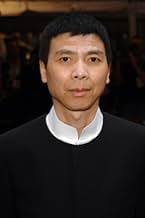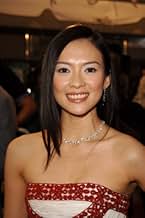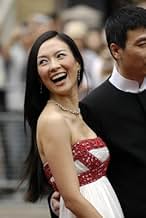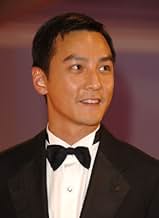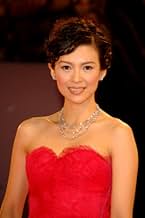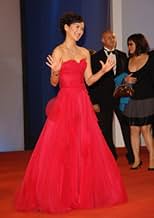VALUTAZIONE IMDb
6,4/10
7278
LA TUA VALUTAZIONE
L'imperatore, l'imperatrice, il principe ereditario, il ministro e il generale hanno tutti i loro nemici che vorrebbero uccidere in un banchetto notturno.L'imperatore, l'imperatrice, il principe ereditario, il ministro e il generale hanno tutti i loro nemici che vorrebbero uccidere in un banchetto notturno.L'imperatore, l'imperatrice, il principe ereditario, il ministro e il generale hanno tutti i loro nemici che vorrebbero uccidere in un banchetto notturno.
- Regia
- Sceneggiatura
- Star
- Premi
- 10 vittorie e 25 candidature totali
Yanbin Liu
- Messenger
- (as Liu Yanbin)
Recensioni in evidenza
"The Banquet" is a loose adaptation of Shakespeare's "Hamlet" which, I believe, is Shakespeare's most powerful literary creation, and one which has been adapted (as I count) 5 times in the silver screen (my personal fave is the version with Mel Gibson; I have yet to watch the one with Ethan Hawke). This adaptation is so loose that oftentimes it feels like it has its own originality and only drew inspiration from "Hamlet".
One of the original aspects of the film is that of the character played by Ziyi Zhang, which is a product of a revision of the original script. A revision which added quite a depth to the storyline. Gong Li (Memoirs of a Geisha, Miami Vice, Farewell My Concubine) was originally supposed to play Zhang Ziyi's part. Maggie Cheung (2046, Hero) was also considered for the role. Due to scheduling conflicts. When Ziyi Zhang took over the part, the script was rewritten to make the character younger. Her character is a former love interest of the Prince Wu Luan (the main character) but was later wed to the Prince's own father and eventually, to become the Empress to his uncle. Such a character has given a large amount of dramatic tension to the storyline and further complicates it, making the story more unpredictable even though it is an adaptation.
It is such a wicked delight to see Ziyi Zhang play such a dark snake of a character in this movie, a character who claims a love which is actually of self rather than something pure. Since her breakthrough in "Crouching Tiger..." she has proved time and again that the potency of her talent doesn't easily wither, and in her youth she has already made great performances, more than enough to satisfy a cinema-acting retiree. Likewise, impressive performances from Daniel Wu as the Prince Wu Luan, (the alluring & yummy) Xun Zhou as the Opheliac Qing Nu, Jingwu Ma as the wise Minister, and You Ge who also deserves much praise for playing the Emperor Li, a character who defies being generalized as black & white; a character which is richly layered with many levels. THE BANQUET is mainly drama, You do not watch this film for the Martial Arts, even though Yuen Woo Ping has a hand in the making of this film as both producer and action choreographer (I would consider Yuen Woo Ping as the living god of Martial Arts movies, having directed timeless classics like "Snake in the Eagle's Shadow" & "Drunken Master" until now, & was given international spotlight when he worked as Fight choreographer of "The Matrix" movies), but you watch this movie for its beautiful storyline. Although there are moments that induce awe in some of the fight sequences, these are expected to be minimal compared to the dialogue-driving motion of the film. It may even be observed that the martial arts here is a mere icing on the cake.
Along with that icing is the amazing visuals that it presents. From flying stunts, to set designs to costumes. You can feast your eyes upon the visuals, which wakes up viewers from a possible boredom. It employs a semi-surreal style of setting.
It seems that ever since it broke into worldwide popularity, "Crouching Tiger, Hidden Dragon" has opened the floodgates for Chinese dramatic epics which are done in "closed form" of movies, movies which such a forced unnatural ambiance that generally use wire-works to do fantastic martial arts feats and exaggerated vibrancy and style on sets which depict surreal environments (although this style was long used in Hong Kong, but mostly only for action epics). But this type of fantasy-like genre was getting old and it needed to be complemented with really good story lines. Such was achieved by Yimou Zhang's "Hero" (which starred Jet Li & Donnie Yen). This same surreal "closed form" style is employed by THE BANQUET.
THE BANQUET is powerful, dramatically rich, and such a masterpiece of a work, as dark and beautiful as the Shakespearean tragedy from which it is based on.
One of the original aspects of the film is that of the character played by Ziyi Zhang, which is a product of a revision of the original script. A revision which added quite a depth to the storyline. Gong Li (Memoirs of a Geisha, Miami Vice, Farewell My Concubine) was originally supposed to play Zhang Ziyi's part. Maggie Cheung (2046, Hero) was also considered for the role. Due to scheduling conflicts. When Ziyi Zhang took over the part, the script was rewritten to make the character younger. Her character is a former love interest of the Prince Wu Luan (the main character) but was later wed to the Prince's own father and eventually, to become the Empress to his uncle. Such a character has given a large amount of dramatic tension to the storyline and further complicates it, making the story more unpredictable even though it is an adaptation.
It is such a wicked delight to see Ziyi Zhang play such a dark snake of a character in this movie, a character who claims a love which is actually of self rather than something pure. Since her breakthrough in "Crouching Tiger..." she has proved time and again that the potency of her talent doesn't easily wither, and in her youth she has already made great performances, more than enough to satisfy a cinema-acting retiree. Likewise, impressive performances from Daniel Wu as the Prince Wu Luan, (the alluring & yummy) Xun Zhou as the Opheliac Qing Nu, Jingwu Ma as the wise Minister, and You Ge who also deserves much praise for playing the Emperor Li, a character who defies being generalized as black & white; a character which is richly layered with many levels. THE BANQUET is mainly drama, You do not watch this film for the Martial Arts, even though Yuen Woo Ping has a hand in the making of this film as both producer and action choreographer (I would consider Yuen Woo Ping as the living god of Martial Arts movies, having directed timeless classics like "Snake in the Eagle's Shadow" & "Drunken Master" until now, & was given international spotlight when he worked as Fight choreographer of "The Matrix" movies), but you watch this movie for its beautiful storyline. Although there are moments that induce awe in some of the fight sequences, these are expected to be minimal compared to the dialogue-driving motion of the film. It may even be observed that the martial arts here is a mere icing on the cake.
Along with that icing is the amazing visuals that it presents. From flying stunts, to set designs to costumes. You can feast your eyes upon the visuals, which wakes up viewers from a possible boredom. It employs a semi-surreal style of setting.
It seems that ever since it broke into worldwide popularity, "Crouching Tiger, Hidden Dragon" has opened the floodgates for Chinese dramatic epics which are done in "closed form" of movies, movies which such a forced unnatural ambiance that generally use wire-works to do fantastic martial arts feats and exaggerated vibrancy and style on sets which depict surreal environments (although this style was long used in Hong Kong, but mostly only for action epics). But this type of fantasy-like genre was getting old and it needed to be complemented with really good story lines. Such was achieved by Yimou Zhang's "Hero" (which starred Jet Li & Donnie Yen). This same surreal "closed form" style is employed by THE BANQUET.
THE BANQUET is powerful, dramatically rich, and such a masterpiece of a work, as dark and beautiful as the Shakespearean tragedy from which it is based on.
The women' death is because of the love.
The men' death is because of the women.
Desire is the measure, is the excuse.
Finally, desire is defeated to the love and the death.
In this war, the winner is
Beautiful clothes, lovely music and song, strange marks, tragedy character, moving story. It shows you that what Chinese' value is, what the love is, what the human' heart is. You will think deeply from your heart, you may understand the different among the cultures to express the familiar story. Think about Hamlet.
People don't understand each other, if they do, there is no one alone.
The men' death is because of the women.
Desire is the measure, is the excuse.
Finally, desire is defeated to the love and the death.
In this war, the winner is
Beautiful clothes, lovely music and song, strange marks, tragedy character, moving story. It shows you that what Chinese' value is, what the love is, what the human' heart is. You will think deeply from your heart, you may understand the different among the cultures to express the familiar story. Think about Hamlet.
People don't understand each other, if they do, there is no one alone.
It's an oriental kung fu Hamlet.
Everyone's been saying it's loosely based on Shakespeare's tragedy, and to some, the movie's indeed a tragedy with its slowness in pace and lack of action, but I'd like to see it as because of its heavy reference to Hamlet (the poisoned quill, and many other plot points and scenes), it sort of created a crutch on which to lean the movie upon, hence the familiarity to some, therefore having the source serving as a double edged sword - the movie beholden to it and eventually ending it on a weak note.
Having inherited the creative team of Yuen Wo Ping (action choreography), Tan Dun (Music), Tim Yip (Art Direction), and the starlet in Ziyi Zhang (wonder why the westernized juxtaposition of her name) does not automatically replicate the success of Crouching Tiger Hidden Dragon that easily. It's the X-factor and the blending of elements of novelty in CTHD that made it a huge success, and blindly following the predetermined formula is akin to hammering a square peg into a round hole.
While the art direction is lush and everything looking adequately regal, somehow Tan Dun's music seemed to be muted throughout the movie, only exhibiting sporadic brilliance to drum up scenes with the soundtrack, or the hauntingly beautiful theme song. The major disappointment however, will be in the fighting scenes. Here, martial arts both function as a contrast to the much muted artsy style of the Hamlet here, Prince Wu Luan (Daniel Wu), highlighting the difference in power between the pen and the sword, as well as functioning as foreplay. I thought with the gratuitous fake blood spewing across the screen, it was kind of a homage to 70s Shaw Bros martial arts classics, and a nod to director Chang Cheh, the king of ketchup blood. The initial big sequenced battle scene might have whet appetites, but sadly subsequent battles do not match up, with its repetitive running up walls or in mid air, as if Yuen had run out of tricks in the wire-work manual, having at one point seemed to copy Tsui Hark's Dao (1995). There's one moment of innovation though in a scene of punishment not seen (at least to me) before.
But not that I'm complaining. If this martial arts in this movie is viewed without comparisons to other more recent fantasy martial arts movies like Hero and House of Flying Daggers, it is still enjoyable and beautifully choreographed, and surpasses The Promise by a huge mile. Just that it lacked a fresh look in battles, and the unimaginative costuming of the Imperial Guards didn't help, looking too close like distant cousins of Lord of the Ring's Nazguls / Ringwraiths / Black Riders.
Desire as a theme runs through the movie very strongly, the desire for love, endless power and pure, unadulterated revenge. Very briefly, the story by now will be fairly obvious with Emperor Li (Ge You) usurping the throne from his brother, and coverts his wife Empress Wan as his own, who at one point in time was Prince Wu Luan's old flame. The Prince here is a fellow in love with the arts and bent on avenging his father, and who is the subject of unrequited love by the daughter of a minister - Qing Nu (Zhou Xun).
It's all about the wearing of masks and the building of facades, of hiding true intentions to achieve personal objectives. The contrast between the two men in the Emperor and the Prince is looked into, their love lives examined - one who uses power to obtain love, while the other's fortune to be loved brought him unimaginable influence.
Despite its references to Hamlet, the focus of the movie here seemed to be Ziyi Zhang's Empress Wan, as she plots and schemes, leaving you perplexed as to whether to sympathize and pity her, or applaud her attempts at exacting her own brand of justice. Acting all round is nothing to rave about, and though Ge You's performance seemed the better of the lot, his measured, subtle ways as the Emperor comes off rather weakly as a man capable of scheming to get to where he is. Somehow, I thought that Hamlet allowed the acting to take a foot off the pedal as audiences would already put in place perceptions and direct translations of character for character.
All said, The Banquet is still a reasonably competent foray into the martial arts genre for director Feng Xiaogang, and if he were to put another movie from the genre out, I'll sure be there to watch it. Now to anticipate Zhang Yimou's next contribution to the genre.
Everyone's been saying it's loosely based on Shakespeare's tragedy, and to some, the movie's indeed a tragedy with its slowness in pace and lack of action, but I'd like to see it as because of its heavy reference to Hamlet (the poisoned quill, and many other plot points and scenes), it sort of created a crutch on which to lean the movie upon, hence the familiarity to some, therefore having the source serving as a double edged sword - the movie beholden to it and eventually ending it on a weak note.
Having inherited the creative team of Yuen Wo Ping (action choreography), Tan Dun (Music), Tim Yip (Art Direction), and the starlet in Ziyi Zhang (wonder why the westernized juxtaposition of her name) does not automatically replicate the success of Crouching Tiger Hidden Dragon that easily. It's the X-factor and the blending of elements of novelty in CTHD that made it a huge success, and blindly following the predetermined formula is akin to hammering a square peg into a round hole.
While the art direction is lush and everything looking adequately regal, somehow Tan Dun's music seemed to be muted throughout the movie, only exhibiting sporadic brilliance to drum up scenes with the soundtrack, or the hauntingly beautiful theme song. The major disappointment however, will be in the fighting scenes. Here, martial arts both function as a contrast to the much muted artsy style of the Hamlet here, Prince Wu Luan (Daniel Wu), highlighting the difference in power between the pen and the sword, as well as functioning as foreplay. I thought with the gratuitous fake blood spewing across the screen, it was kind of a homage to 70s Shaw Bros martial arts classics, and a nod to director Chang Cheh, the king of ketchup blood. The initial big sequenced battle scene might have whet appetites, but sadly subsequent battles do not match up, with its repetitive running up walls or in mid air, as if Yuen had run out of tricks in the wire-work manual, having at one point seemed to copy Tsui Hark's Dao (1995). There's one moment of innovation though in a scene of punishment not seen (at least to me) before.
But not that I'm complaining. If this martial arts in this movie is viewed without comparisons to other more recent fantasy martial arts movies like Hero and House of Flying Daggers, it is still enjoyable and beautifully choreographed, and surpasses The Promise by a huge mile. Just that it lacked a fresh look in battles, and the unimaginative costuming of the Imperial Guards didn't help, looking too close like distant cousins of Lord of the Ring's Nazguls / Ringwraiths / Black Riders.
Desire as a theme runs through the movie very strongly, the desire for love, endless power and pure, unadulterated revenge. Very briefly, the story by now will be fairly obvious with Emperor Li (Ge You) usurping the throne from his brother, and coverts his wife Empress Wan as his own, who at one point in time was Prince Wu Luan's old flame. The Prince here is a fellow in love with the arts and bent on avenging his father, and who is the subject of unrequited love by the daughter of a minister - Qing Nu (Zhou Xun).
It's all about the wearing of masks and the building of facades, of hiding true intentions to achieve personal objectives. The contrast between the two men in the Emperor and the Prince is looked into, their love lives examined - one who uses power to obtain love, while the other's fortune to be loved brought him unimaginable influence.
Despite its references to Hamlet, the focus of the movie here seemed to be Ziyi Zhang's Empress Wan, as she plots and schemes, leaving you perplexed as to whether to sympathize and pity her, or applaud her attempts at exacting her own brand of justice. Acting all round is nothing to rave about, and though Ge You's performance seemed the better of the lot, his measured, subtle ways as the Emperor comes off rather weakly as a man capable of scheming to get to where he is. Somehow, I thought that Hamlet allowed the acting to take a foot off the pedal as audiences would already put in place perceptions and direct translations of character for character.
All said, The Banquet is still a reasonably competent foray into the martial arts genre for director Feng Xiaogang, and if he were to put another movie from the genre out, I'll sure be there to watch it. Now to anticipate Zhang Yimou's next contribution to the genre.
The cinematography of this movie is wonderful, and anyone willing to sit through a movie of any stripe to see a fresh sword fight on a gorgeous mountainside should see this movie. I particularly liked the way that fighting scenes in the movie were sometimes juxtaposed next to musical performances complete with beautiful, slow movements by dancers. I think the comparison heightened my sense of the ballet-like quality of the otherwise violent confrontations. Those lead to consider seeing this movie on suggestions that it presents an artful re-imagination of Shakespeare's Hamlet--the one I read was in the Beijing Daily--should look elsewhere, however. This movie is a study in how a complex and interesting character study of one of the most enigmatic characters in the history of drama could be rendered both cliché and senseless.
this film is beautiful to look at. Scenery is great, the way the scenes are set up, the colours and the lighting are fantastic. Even the actors are beautiful to look at - Zhang Zhi Yi is at her sensual best.
The story did have some interesting twists but not too many which is why some on here are complaining it's not 'complex' or 'layered' enough. But compared to a regular Hollywood film and this one is much better.
The acting is uneven. Daniel Wu had a tough time adding any depth to his morose character. I guess he's the Chinese version of Hayden Christenson. Zhang Zhi Yi really shines as does Zhou Xun. Ge You also plays the usurping emperor with passion and adds a bit of humanity to him - he's not just an evil bad guy to be hated.
8/10
The story did have some interesting twists but not too many which is why some on here are complaining it's not 'complex' or 'layered' enough. But compared to a regular Hollywood film and this one is much better.
The acting is uneven. Daniel Wu had a tough time adding any depth to his morose character. I guess he's the Chinese version of Hayden Christenson. Zhang Zhi Yi really shines as does Zhou Xun. Ge You also plays the usurping emperor with passion and adds a bit of humanity to him - he's not just an evil bad guy to be hated.
8/10
Lo sapevi?
- QuizBoth Gong Li and Maggie Cheung were originally considered playing the queen's role. When Ziyi Zhang took over the part, the script was rewritten to make the character younger.
- ConnessioniReferenced in Panel Quiz Attack 25: Episodio datato 10 giugno 2007 (2007)
I più visti
Accedi per valutare e creare un elenco di titoli salvati per ottenere consigli personalizzati
Dettagli
- Data di uscita
- Paese di origine
- Siti ufficiali
- Lingua
- Celebre anche come
- The Banquet
- Luoghi delle riprese
- Inner Mongolia, Cina(A'er Mountain)
- Aziende produttrici
- Vedi altri crediti dell’azienda su IMDbPro
Botteghino
- Budget
- 15.000.000 USD (previsto)
- Lordo in tutto il mondo
- 22.598.772 USD
- Tempo di esecuzione2 ore 11 minuti
- Colore
- Mix di suoni
- Proporzioni
- 2.35 : 1
Contribuisci a questa pagina
Suggerisci una modifica o aggiungi i contenuti mancanti


